Augsburg Fortress Studies in the Gospels Collection (7 vols.)
Digital Logos Edition
Overview
The Augsburg Fortress Studies in the Gospels Collection presents recent scholarly treatments of Jesus, the Gospels, and Christian literature. It brings attention to parables studies, concentrating on the parables in their Gospel contexts, illustrating current interpretation methods, and synthesizing literary analysis’ evolution. The collection includes a collection of Jesus’ sayings, providing insight on contemporary research, study methods, presuppositions, and theological and theoretical issues. It introduces the content, contexts, and structure surrounding the Gospels and examines various traditions and practices that shaped them and other early Christian literature. One volume focuses on synoptic miracle stories’ structure, reproduction, and function.
The Logos Bible Software edition of the Augsburg Fortress Studies in the Gospels Collection is designed to encourage and stimulate your study and understanding of the Gospels. Scripture passages link directly to your English translations and to the original language texts, and important theological concepts link to dictionaries, encyclopedias, and a wealth of other resources in your digital library. In addition, you can perform powerful searches by topic and find what other authors, scholars, and theologians have to say about the Gospels, Christian literature, and Jesus’ parables and miracles.

Key Features
- Provides contemporary New Testament research
- Analyzes the Gospels and Christian literature in their social, religious, and political contexts
- Includes fresh insights on Jesus’ parables and miracles
Product Details
- Title: Augsburg Fortress Studies in the Gospels Collection
- Publisher: Augsburg Fortress
- Volumes: 7
- Pages: 1,934
Individual Titles
- Fortress Introduction to the Gospels by Mark Allan Powell
- From Jesus to the Gospels: Interpreting the New Testament in Its Context by Helmut Koester
- The Gospel in Parable: Metaphor, Narrative, and Theology in the Synoptic Gospels by John R. Donahue
- Hear Then the Parable: A Commentary on the Parables of Jesus by Bernard Brandon Scott
- The Miracle Stories of the Early Christian Tradition by Gerd Theissen
- The Parables of Jesus: Recovering the Art of Listening by Richard Q. Ford
- Power in Weakness: New Hearing for Gospel Stories of Healing and Discipleship by Frederick Houk Borsch
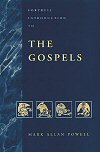
With clarity and verve, Mark Allan Powell describes the contents and structure of the Gospels, their distinctive characteristics, and their major themes. An introductory chapter surveys the political, religious, and social world of the Gospels, methods of approaching early Christian texts, the genre of the Gospels, and the religious character of these writings. Included also are comments on the Gospels that are not found in the New Testament. Special features, including illustrations and more than two dozen special topics, enhance this convenient volume.
A reliable and lucid description of contemporary Gospel studies for the general reader. Mark Powell writes so clearly that this book will easily serve for individual study and church groups as well as a text in introductory bible courses.
—Pheme Perkins, professor, Boston College
In relatively small compass, Mark Powell has managed to present the information that is essential to a sound understanding of the origin and nature of the Gospels. This little gem of a book is enhanced by numerous charts and diagrams, making it an ideal classroom textbook.
—Donald A. Hagner, Emeritus George Eldon Ladd Professor of New Testament, Fuller Theological Seminary
Mark Allan Powell is a Lutheran pastor and the Robert and Phyllis Leatherman Professor of New Testament at Trinity Lutheran Seminary, Columbus, Ohio. He is also one of the authors of Opening the Book of Faith.
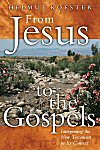
Helmut Koester, one of today’s foremost New Testament scholars, offers a lifetime’s insights into the message of the historical Jesus and the traditions, practices, and trajectories that shaped the Gospels and other early Christian literature including “Q” and the Gnostic Gospels.
Helmut Koester is the John H. Morison Research Professor of Divinity and the Winn Research Professor of Ecclesiastical History at Harvard Divinity School in Cambridge, Massachusetts, and chair of the New Testament Board of the Hermeneia commentary series. He is editor of numerous volumes in the Hermeneia series as well as Cities of Paul: Images and Interpretations from the Harvard New Testament and author of Paul and His World: Interpreting the New Testament in Its Context.
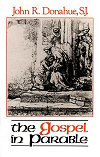
Professor Donahue here argues that “the parables of Jesus” offer a Gospel in miniature, while at the same time giving shape, direction, and meaning to the Gospels in which they appear. “To study the parables of the Gospels is to study the gospel in parable.” After surveying recent discussions of parable, metaphor, and narrative, Donahue examines and interprets the parables of Mark, Matthew, and Luke as texts in the context of the theology of each of these Gospels. Finally, he outlines what “The Gospel in Parable” looks like and offers suggestions for the proclamation of parables today.
Rarely does one find a book of equal interest to scholar and preacher. This is one. Scholar and preacher will be interested in a book that in exceptionally clear prose adroitly balances current methods of parable interpretation in order to understand the parables in their various contexts that they may be proclaimed again in our context.
—Sallie McFague, distinguished theologian in residence, Vancouver School of Theology
Among the many fine books on the New Testament parables in recent years, Donahue’s work stands out for its concentration on the meaning of the parables in their Gospel contexts. His clear and orderly interpretations are based on a thorough mastery of contemporary scholarship. Students and scholars alike can learn much about the parables and the Synoptic Gospels from this mature study.
—Daniel J. Harrington, professor, Boston College School of Theology and Ministry
John R. Donahue is emeritus professor of New Testament at the Jesuit School of Theology, Graduate Theological Union, Berkeley, California.
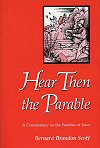
By building on the labors of such illustrious predecessors as Adolf Jülicher, C. H. Dodd, and Joachim Jeremias, as well as the modern findings of Robert Funk, Dan Via, and John Dominic Crossan, Scott provides the most encyclopedic account of the parables in years. Hear Then the Parable is an innovative literary-social reading of all the parables of Jesus.
Bernard Brandon Scott’s Hear Then the Parable is a superb synthesis of where we have come from in terms of literary analysis and where we are going in terms of social analysis.
—John Dominic Crossan, president, Society of Biblical Literature
Hear Then the Parable is the most comprehensive study of the parables in half a century. Scott’s reading of the parables is filled with flashes of brilliant insight. Everyone who interprets the parables—in pulpit, classroom, or personal study—will want to own the book.
—David Buttrick, Emeritus Drucilla Buffington Professor of Homiletics and Liturgics, Vanderbilt Divinity School
Bernard Brandon Scott is the Darbeth Distinguished Professor of New Testament at Phillips Graduate Seminary, Tulsa, Oklahoma.
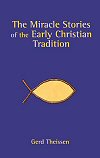
A fascinating study of the synoptic miracle stories which looks at their structure, reproduction, and function.
This is an impressive book. [Theissen] makes use of form criticism, structural analysis, sociological analysis, and history of religious studies to probe the miracle stories in the synoptic Gospels, and he offers fresh perspectives on them. . . . It charts a new course, and all further work on the miracles stories will have to contend with it.
—Arland Hultgren, emeritus professor of New Testament, Luther Seminary
Theissen is a pioneer who casts his net wide. . . . Those who preach on the miracle stories can gain a great deal from Theissen’s analysis, yet another excellent contribution to the social-scientific study of religion from a talented scholar.
—Anglican Theological Review
The exegete who has been toiling closely on the texts of the synoptic miracle stories will find that this book provides a helpful perspective on the larger hermeneutical issues from the vantage point of structuralism.
—David Tiede, emeritus president, Luther Seminary
[This] study is sophisticated, informative, and methodologically progressive. It will be indispensable for further research on the synoptic miracle stories.
—Journal of the American Academy of Religion
Gerd Theissen is a professor of New Testament theology at the University of Heidelberg, Germany, and author of The Religion of the Earliest Churches and The Shadow of the Galilean. He is coauthor of The Historical Jesus: A Comprehensive Guide and coeditor of The Social Setting of Jesus and the Gospels.
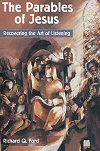
In this startlingly original interpretation, Ford explores seven of the longer parables attributed to Jesus. Bypassing the assumption that the superior character represents God and the subordinate one the Christian believer, Ford focuses instead on how persons, long separated by inequality, are called upon to collaborate.
Drawing on his own psychotherapy training, Ford offers novel insights into ways the characters persist in their mutual misunderstandings. He then shows how Jesus’ stories envelop listeners in these same distortions, only to lure them—and ourselves—into the work of imagining reconciliation.
One feature makes this book special, another makes it extraordinary. It is not new for biblical scholars to move into realms of psychotherapy where they walk as amateurs. It is much more novel for a professional psychotherapist to move into biblical studies with enough preparation to be far beyond amateur standing. But it is this book’s subtitle that makes it extraordinary. It is about the lost art of ‘listening,’ about dialogues rather than twin simultaneous monologues, about personal and social interaction, especially in cases of inequality. With care, delicacy, and tenderness, Richard Ford listens to parable characters reacting to one another, imagines client and therapist in analogous situations, and teaches us all to shut up long enough to hear another’s voice.
—John Dominic Crossan, president, Society of Biblical Literature
Ford’s interpretation of the parables is provocative and creative . . . Preachers will find here loads of fresh approaches to texts that seem to have been preached to death.
—Robert Kysar, emeritus professor of preaching and New Testament, Candler School of Theology, Emory University
Richard Q. Ford is a clinical psychologist in the private practice of psychotherapy in Williamstown, Massachusetts.
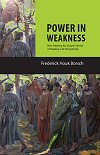
Power in Weakness provides profound meditations on the healing stories of Jesus from one of the church’s most gifted preacher-poets.
Borsch helps us feel our way into the text. . . . We experience the healing of a dumb man from within the consciousness of the tormented victim. We climb inside the skin of Andrew and feel his smug contempt for pagans and Gentiles, and his impatience with the Syrophoenician woman. With the flick of the writer’s pen, we are that desperate woman. Served up with substantial biblical and theological commentary and laced with engaging experiences from the author’s life, these stories bridge the gap between past history and contemporary interests and invite us to further study and reflection.
—Jerry K. Robbins, emeritus campus pastor, West Virginia University
This is a ‘comforting’ book in the original meaning of the word. Like Elijah we are strengthened for the journey which we must of necessity make. We may not know exactly where we are going, but it is good to know that we have this kind of company along the way.
—Anglican Theological Review
When one first picks up this book one feels enriched by being in the presence of an exceptional storyteller. . . . Borsch has given us much more than a book of stories. He has significantly closed the gap between the preacher and the scholar.
—St Luke’s Journal of Theology
Frederick H. Borsch was an Episcopal Bishop of Los Angeles from 1988 to 2002. He currently serves as a professor of New Testament and chair of Anglican studies at The Lutheran Theological Seminary at Philadelphia. A frequent contributor to Proclamation, he is author of Many Things in Parables and Outrage and Hope, among other books.